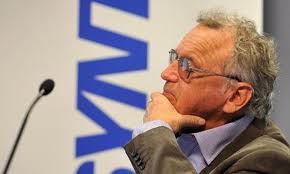 J&J’s Synthes deal purportedly benefited chairman (Bloomberg News)
J&J’s Synthes deal purportedly benefited chairman (Bloomberg News)
Johnson & Johnson’s $21.3 billion buyout of Synthes Inc. shortchanged the medical-device maker’s investors while improperly benefiting its chairman, a lawyer argued in court.
Synthes Chairman Hansjoerg Wyss, the company’s controlling shareholder, engineered the J&J buyout to meet his retirement needs rather than to get the highest price for the maker of devices to treat trauma victims, Andrew Abramowitz, an attorney for two pension funds suing over the deal, told Delaware Chancery Court Judge Leo Strine on Friday.
Wyss “put his unique concerns ahead of the interests of other shareholders,” Abramowitz said at a hearing in Wilmington.
J&J, the world’s second-biggest seller of health-care products, said June 12 that it entered into accelerated buyback agreements for about $12.9 billion in shares with Goldman Sachs Group Inc. and JPMorgan Chase & Co. to help pay for the cash-and-stock acquisition of Synthes. U.S. antitrust regulators gave clearance for the deal earlier this month.
Synthes shareholders are to receive about 55.65 Swiss francs ($58.66) and about 1.72 J&J shares for each share they own. The shares of West Chester, Pennsylvania-based Synthes trade in Switzerland, Wyss’s home country.
J&J will gain a dominant position in the trauma market with the acquisition, officials of the New Brunswick, New Jersey- based company said when the deal was announced in April 2011. Synthes has 50 percent of the market for sales of screws, plates, bone grafts and other products to treat skeletal injuries, Navid Malik, now an analyst with Cenkos Securities Plc in London, told Bloomberg News in an interview last year.
Synthes also agreed in May 2011 to sell its Norian unit, which pleaded guilty to felony and misdemeanor criminal charges for conducting an unauthorized trial of its bone-mending cement as part of its marketing efforts, to Kensey Nash Corp. for $22 million. Kensey Nash, a maker of absorbable cardiac medical devices, is a unit of Netherlands-based Royal DSM NA.
Four Synthes executives pleaded guilty in connection with the bone-cement marketing campaign and received sentences ranging from five months to nine months in jail. Prosecutors alleged the officials marketed the cement for spinal fractures even after studies showed it caused blood clots.
Wyss, Synthes’s founder, sought to sell the company so he could retire and become a philanthropist, lawyers for investors, including a Massachusetts-based pension fund and another retirement fund backed by the Teamsters Union, contend in court papers.
Instead of taking higher offers from unidentified private-equity firms, Wyss pushed Synthes’s board to back J&J’s offer so he could sell his shares and gain favorable tax advantages, shareholders’ attorneys argue.
